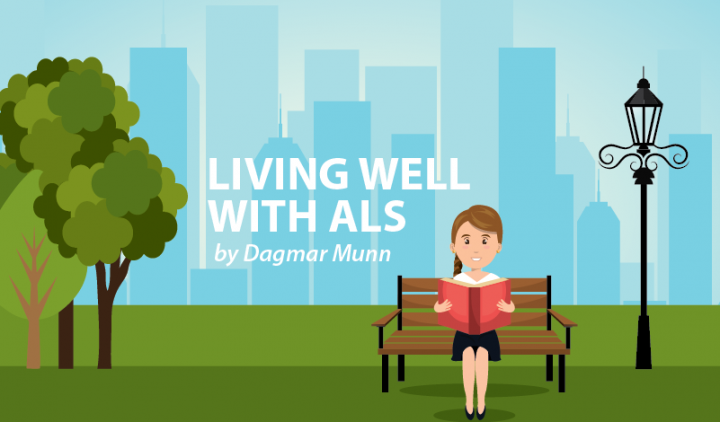Getting Back to the Basics of Mindfulness

Recently, I noticed I was having problems keeping track of time. Not clock time, as in being a little early or showing up too late. But calendar time — the past weeks and months of living in lockdown have caused my days to morph together. I knew I was doing things, I just couldn’t remember what they were.
It was a déjà vu feeling for me, similar to what I felt during the months following my ALS diagnosis. At the time, I fixated on my doctor’s predictions of having only three years to live. Leaving that office, I imagined an expiration date had been stamped on my forehead. I put my life on hold and parked my mind in my own ALS waiting room. Pay attention to what I was doing? Why bother?
But now, a full decade later, I am still here. And I’m so glad I decided to learn to live in the now and be mentally present for every moment. Practicing mindfulness became a valuable coping strategy that helped me push back my mental walls of ALS and continue to engage in life.
But the recent global health crisis has been distracting, and I admit I let my mindfulness practice slide. So, it was back to basics for me.
Practice being present
Practicing mindfulness is easier when there are fewer distractions pulling at our attention. Eating, simple exercises, deep breathing, or bathing are good activities to pair with starting to experience mindfulness.
Conversations become more meaningful and interactions with others are easier to remember when we’re in a mental state of mindfulness.
Mindfulness can also be called “awareness of the present moment.” Here’s a quick example: While you are reading this sentence, become aware of the sounds around you. Feel the warmth in the palms of your hands and be aware of your feet and toes. Continue reading while hearing, feeling hands and feet, and being aware of all existing at the same time.
How to learn mindfulness
I knew that meditating was an excellent way to learn to be mindful. But I didn’t always have the time to meditate. On those days, I used a program developed by Harvard social psychologist Ellen Langer called “Active Mindfulness.” It’s a kind of fast-track method; instead of practicing how to be mindful, you just do it!
Langer’s program has both psychological and physical benefits for ALS patients. I wrote about her studies with ALS patients in a previous column titled “The Power of One Resolution.”
Another excellent resource I turned to was the book “The Power of Now,” by Eckhart Tolle. His book covers the practical aspects of meditation and how to transition being in the present moment to daily living.
Now I’m happily paying attention, have no more lost days, and am focusing on what I’m doing. Worry about the future? Why bother!
I invite you to make mindfulness a daily practice. It’s one more positive coping strategy in our pursuit to live well while living with ALS.
***
Note: ALS News Today is strictly a news and information website about the disease. It does not provide medical advice, diagnosis, or treatment. This content is not intended to be a substitute for professional medical advice, diagnosis, or treatment. Always seek the advice of your physician or other qualified health provider with any questions you may have regarding a medical condition. Never disregard professional medical advice or delay in seeking it because of something you have read on this website. The opinions expressed in this column are not those of ALS News Today or its parent company, Bionews, and are intended to spark discussion about issues pertaining to ALS.







Lida
Very interesting article. I think hypnosis and hypnotherapy could be a useful tool for those who are dealing with ALS. Guided Imagery could be beneficial for inner peace and relaxed mind. Maybe we should take hypnosis serious when we deal with ALS patients and try to make positive changes in their subconscious mind which is overwhelmed with the negative thoughts ALS has created for them.
A positive thought process and a strong hopeful mind could lead to a brighter tomorrow.
Dagmar Munn
I agree with you, Lida. Any and all mind-body techniques that teach and promote self-care, positive thinking and positive change will be helpful to pALS; to heal from hearing the diagnosis to living with the condition... to even healing from the condition.
Cindy
Timely article for me. I had an in person clinic appointment yesterday. While visiting the Occupational Therapist I was lamenting the progression of my disease into my finger hands and diaphragm. He gently reminded me that I can still speak, swallow and think. I need to be reminded to “ accentuate the positive and eliminate the negative. “And to be grateful for each day. ?
Dagmar Munn
Thank you Cindy :-) Yes, with ALS it's wise to not dwell on loss or negative thinking - - to rather focus on what you have in front of you "now."
....however, regarding your diaphragm issues, I might suggest you look at the breathing tips in this blog post: https://alsandwellness.blogspot.com/2020/01/how-blowing-bubbles-helps-me-breathe.html
Sending you good vibes for today :-) Dagmar